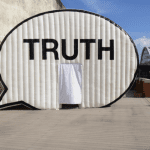
The Christian way of life is the way of the cross. That can and will mean different things for different people. We are not all meant to do, nor should we all do, the same thing. Not all of us will be married. Not all of us will have children. Not everyone who is single is called to the religious life or to the priesthood. We should stop trying to universalize different contexts and situations, trying to force it upon everyone else. For, as long as we do that, we show we have not ourselves truly conformed to the way, that is, the way of the cross, for instead of taking on the cross and using it to show us the way of self-denial, we become assertive, trying to force our inordinate will upon the world.
Everyone is called to find themselves. To find themselves, everyone should connect themselves in some fashion to the cross. And so, if we truly want to come to know ourselves, we must first learn to deny ourselves, not, of course in some sort of nihilistic rage and hate which seeks our own absolute destruction, but rather, we must deny all the undue attachments, all the false constructions which we have placed over the world to define it, and let the world and the truth reveal themselves to be what they are beyond all such impositions. This is especially true for ourselves, for we have constructed a false persona, an individuality which we try to prop up and reify, making it a reality independent from everything else, when in truth, our true persona is seen and discovered by engaging relationships unfettered by such reifications. To deny ourselves is to deny those reifications, to deny those attachments and impositions which we make, so that we can truly embrace reality as it is and not as what we try to make of it, including, and especially, the reality of ourselves. Thus, to truly find ourselves, we pick up the cross, and use it do deny ourselves all those things which we have used to impair our right relationships with each other, with the world at large, and with God. This means that self-denial must be engaged, not with a hate and desire to destroy all things, but with love; true self-denial can only be achieved through love, for that love is what not only will allow ourselves to become known, but to allow ourselves and all those around us to be built up and grow thanks to the revelation of that truth.
This is the paradox of the cross. This is the paradox of the Christian way of life. Self-denial, “death to the self” leads to eternal life, while affirmation of the self as we find and establish it today, only leads to pain and destruction, a “living death.” But it is the paradox which we find Christ encouraging us to embrace:
And he called to him the multitude with his disciples, and said to them, “If any man would come after me, let him deny himself and take up his cross and follow me. For whoever would save his life will lose it; and whoever loses his life for my sake and the gospel’s will save it. For what does it profit a man, to gain the whole world and forfeit his life? For what can a man give in return for his life? For whoever is ashamed of me and of my words in this adulterous and sinful generation, of him will the Son of man also be ashamed, when he comes in the glory of his Father with the holy angels.” (Mk. 8:34-38 RSV).
Jesus made it clear. We must, in some fashion or another, embrace self-denial through the cross. What he meant is not so clear, which is why many take this to all kinds of nihilistic extremes. That is because they forget about the goal, that is, the point is to promote something positive. We are called to the new life. So what must perish is the old way of life, the “old Adam,” so that we can be free from the fetters of sin and truly be what we were meant to be, people who reflect the God of love in the way we live and act. We must die in if we want to live. The only way this makes sense is we understand what is put to death is all that is connected with and bound with falsehood and sin, and the individual way of life those falsehoods encouraged us to embrace. This is why we must keep in mind the goal, for then, we can begin to also understand the process to reach that goal.
The goal is a proper relationship with all things, and that relationship is had in and through love. Love encourages us to give of ourselves to others, and every time we do so, we can be said to die to the self, only to find that, once we have done so, instead of being annihilated and destroyed, we become something else, something greater, more filled with life than we were before such self-giving. That’s the point. The more we give, the more we gain in return, but what we gain is something different than what we gave up, and so in the same way, the more we deny ourselves all the falsehood we used to embrace, the more we will find ourselves becoming free, gaining the vitality of a kind of life which up to that point had been denied us.
Denying the self, dying to the self, in relation to the way of the cross, is something we must choose for ourselves. No one can force us to give of ourselves in this fashion, that is in and out of love. For love to be true, it must be freely given; if what is given is not the gift of the self given out of love, then it is not the self-giving, and death to the self which is revealed to us in and through Jesus on the cross. This is why those who give up something up for Lent, all because someone tells them they have to, does not lead to the same kind of gains, if any, as those who do the same thing out of an act of self-giving love. It is because intention matters, and influences the outcomes of our actions.
Thus, while Great Lent is meant to help facilitate self-giving, because people engage it out of a sense of duty, out of mere obligation, instead of any great intention on their part, in the end, it leaves them hungry, miserable, and confused. They did what they were told to do, but as they didn’t do out with the right intention, it was not able to help them cleanse themselves from all of the falsehoods and attachments they have. The same is true for those who take on the Great Fast in order to look good and holy in front of others. They might get the reward they seek, but they won’t gain out of the fast what they really need. For in the end, they reify the deluded self which they are meant to deny.
The Great Fast can and should be a way of the cross, and so the cross is a sign of what Lent is to be about. No matter what is said, though, no matter how much of this is revealed, in the end, it still is up to us. If we want the most out of Lent, we must engage it properly, engaging self-denial as a way of love, of learning how to give of ourselves more than to remain attached to who and what we think we are. It is not magically going to make us better just because we follow the externals promoted by Lent. This is why, although there are all kinds of great traditions associated with Lent, we must engage them in ways which are appropriate for us and our own situational context. Minor acts of love represent the way of the cross much more than great acts of religious devotion done out of show or to appear great in front of people. Love does not boast. As long as we want to boast about what we have done, of what we think makes us look great, all that we do does not follow the way of the cross, but rather, some pale imitation of it, and so will never provide us what even the most minor of acts done out of love can and will provide.
Stay in touch! Like A Little Bit of Nothing on Facebook.
If you liked what you read, please consider sharing it with your friends and family!
N.B.: While I read comments to moderate them, I rarely respond to them. If I don’t respond to your comment directly, don’t assume I am unthankful for it. I appreciate it. But I want readers to feel free to ask questions, and hopefully, dialogue with each other. I have shared what I wanted to say, though some responses will get a brief reply by me, or, if I find it interesting and something I can engage fully, as the foundation for another post. I have had many posts inspired or improved upon thanks to my readers.













